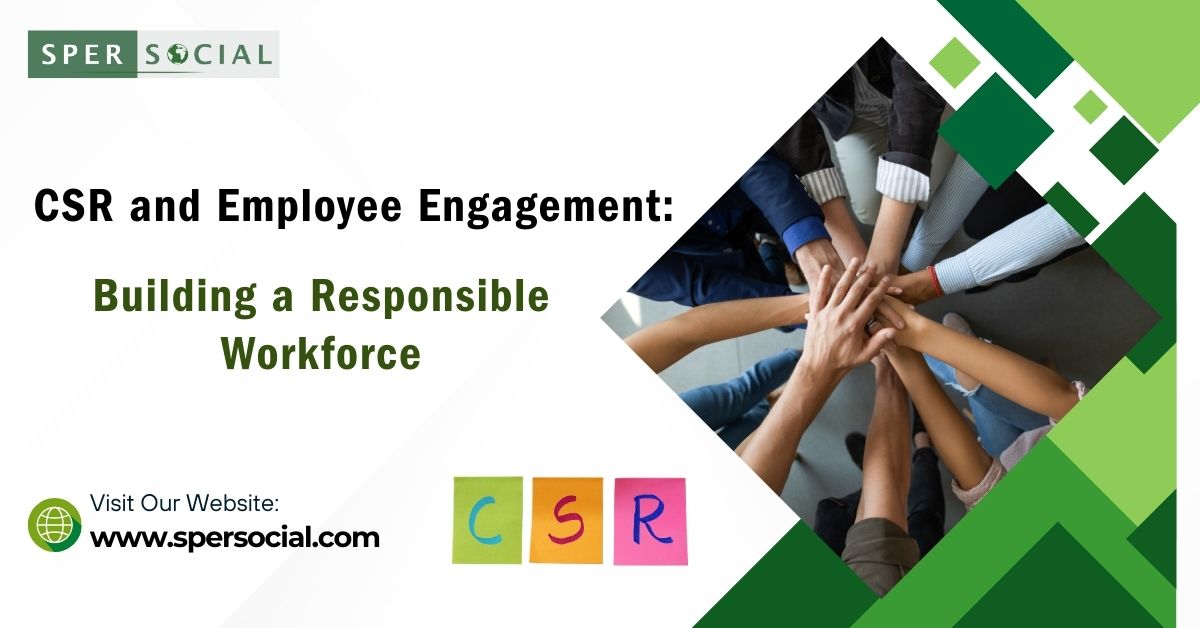
Introduction
Corporate Social Responsibility (CSR) has become a critical element in how companies operate and are perceived by both their customers and employees. In essence, CSR is about businesses taking responsibility for the social, environmental, and economic impact they have on the world. But beyond its external benefits, CSR plays a crucial role internally by deeply influencing employee engagement.
The Role of CSR in Employee Engagement:
Definition of Employee EngagementEmployee engagement refers to the emotional commitment employees have to their organization and its goals. Engaged employees are more likely to invest extra effort in their work, leading to higher productivity, lower turnover, and greater job satisfaction.
How CSR Initiatives Influence Employee Engagement
CSR initiatives can significantly influence employee engagement by aligning the company’s values with those of its employees. When employees see their employer making a positive impact, it fosters a sense of pride and purpose. This, in turn, increases their emotional commitment to the company, making them more engaged in their work.
How CSR Enhances Employee Engagement
CSR initiatives provide employees with opportunities to engage in activities that align with their values and passions. Whether it’s volunteering for a local charity, participating in environmental sustainability programs, or supporting social justice causes, these activities make employees feel that their work has a broader impact beyond the company’s bottom line.
Boosting Employee Morale through CSR
Employee morale is directly tied to how valued and appreciated employees feel within their organization. CSR initiatives can enhance morale by showing employees that their company cares about more than just profits. When employees participate in CSR activities, they experience a sense of accomplishment and pride, knowing they are contributing to a greater good.
CSR and Employee Retention
One of the most significant benefits of CSR is its impact on employee retention. In today’s competitive job market, employees—especially younger generations—are looking for more than just a paycheck. They want to work for companies that share their values and are committed to making a positive impact. CSR initiatives can be a powerful tool for retaining top talent. When employees feel that their company is aligned with their personal values and is making a difference in the world, they are more likely to stay with the company long-term. Companies that successfully integrate CSR into their business strategy often see lower turnover rates and higher employee loyalty.
CSR’s Influence on Productivity
A strong sense of purpose is a key driver of productivity. When employees believe that their work is contributing to something meaningful, they are more motivated to perform well and contribute to the company’s success. CSR initiatives can help create this sense of purpose by connecting employees’ daily tasks with broader social or environmental goals. For instance, a company that prioritizes sustainability might encourage employees to find ways to reduce waste or conserve resources in their departments. This not only supports the company’s CSR goals but also gives employees a sense of ownership and pride in their work, leading to increased productivity and job satisfaction.
Challenges in Implementing CSR for Employee Engagement
Implementing CSR initiatives that effectively engage employees can be challenging. Common obstacles include limited resources, lack of employee buy-in, and difficulties in measuring the impact of CSR programs. To overcome these challenges, companies need to clearly communicate the importance of CSR, provide opportunities for employee involvement, and align CSR initiatives with the company’s core values and business goals. It’s also essential for companies to be transparent about their CSR efforts and to involve employees in the planning and execution of these initiatives. This not only increases employee buy-in but also ensures that CSR programs are relevant and impactful.
The Future of CSR and Employee Engagement
As businesses continue to navigate the complexities of the modern workplace, the role of CSR in employee engagement is likely to grow even more significant. Emerging trends in CSR include a greater focus on sustainability, diversity and inclusion, and social justice. Companies that prioritize these issues are likely to see increased employee engagement, better retention rates, and higher productivity.
Conclusion
CSR is more than just a corporate responsibility; it’s a powerful tool for building a responsible and engaged workforce. By aligning business goals with social and environmental causes, companies can boost employee morale, retention, and productivity. CSR provides employees with a sense of purpose and community, making them more committed to their work and to the company’s success. As businesses continue to evolve, CSR will undoubtedly play a crucial role in shaping the future of work.
SPER SOCIAL
SPER SOCIAL, your premier destination for innovative solutions in Corporate Social Responsibility (CSR) and Environmental, Social, and Governance (ESG) initiatives. At SPER SOCIAL, we pride ourselves on our expertise, tailored solutions, global perspective, and commitment to long-term impact. With a passion for sustainability and a dedication to making a difference, we empower organizations to navigate the complexities of CSR and ESG with confidence and purpose.
#303-304, Tower B, Noida One, Sector 62, Noida, India
contact@spersocial.com
+1-347-460-2899
+91-959-915-8047
